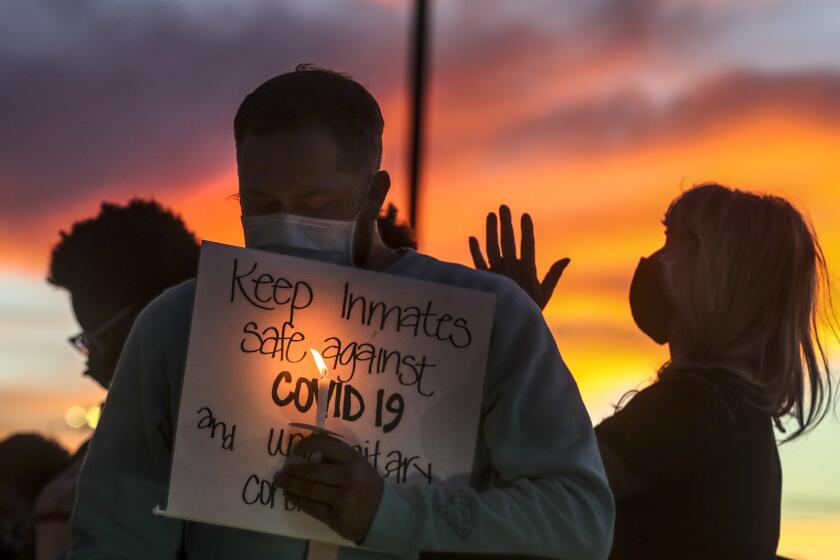Doctor accused of using addicts in medical fraud scheme is out of jail with COVID-19
- Share via
A Beverly Hills surgeon accused of scamming nearly $29 million in insurance money after prosecutors said he recruited patients to undergo unnecessary medical procedures has been released from jail after testing positive for the coronavirus.
Dr. Randy Rosen is charged with 88 felony counts in two criminal cases in Orange County.
Court documents show Rosen, 57, and his 41-year-old girlfriend, Liza Vismanos, used so-called body brokers to find and pay sober living facility patients to complete medical visits that were then billed to insurance companies. Among the procedures were cortisone injections and implants of naltrexone, a drug that can reduce cravings for opioids and alcohol.
The pair and four others are connected with the $52-million scheme, according to the district attorney’s office. About $12 million was kicked back to the body brokers, whom prosecutors called “junkie hunters,” and a smaller portion was given to each individual who was treated. Rosen bragged on texts about pocketing $18,400 for a single injection, records show.
“A massive network of body brokers amassed by the defendant, the sheer number of medically unnecessary procedures performed on vulnerable drug-addicted patients” and the extended span of time in which the criminal activity was conducted led to the charges this summer, court papers said.
Authorities apprehended Rosen — who operates Wellness Wave surgical center in Beverly Hills and Vismanos Lotus Laboratories, a toxicology testing facility in Los Alamitos — after one of the body brokers was granted immunity in exchange for cooperation and investigators were able to mine his electronic devices for records, including secret recordings he made while working for Rosen in 2017 and 2018.
Data analysis finds that 1 in 5 prisoners in every five state and federal prisoners has tested positive for the coronavirus, a rate more than four times higher than in the general population.
After a lengthy and complex preliminary hearing, a judge ruled in October there was sufficient evidence to hold Rosen for trial, and he has been in the Orange County Jail in lieu of $10 million bail since. Vismanos was released on $100,000 bond.
Rosen tested positive for the coronavirus while in jail. More than 600 inmates have become infected with the virus in Orange County, data from the Sheriff’s Department show.
In pushing for his release, defense lawyers argued that Rosen was at great risk of complications from the illness because of a history of chronic obstructive pulmonary disease, fat around his waist, coronary artery disease, sleep apnea and high blood pressure.
But prosecutors insisted that despite his diagnosis, Rosen was asymptomatic. Dr. C. Hsien Chang, the medical director for the county’s Correctional Health Services, said he was “familiar with Rosen’s medical conditions and [has] complete confidence that CHS can appropriately manage and treat his medical conditions while in the Orange County Jail.”
As a white-collar criminal not accused of violence, Rosen is the kind of inmate judges are increasingly releasing to reduce overcrowding across California as the pandemic continues to spread across the state. Orange County Sheriff Don Barnes has been ordered to reduce the jail population by half to prevent the spread of the virus and allow more social distancing.
Superior Court Judge Shirley Hanson agreed that Rosen should be released while awaiting trial, which has not been scheduled. On Thursday, he was granted zero bail and placed on home confinement for 30 days.
On Friday, Rosen was back in his $14-million, 9,000-square-foot West Los Angeles mansion, complete with lap pool and wine cellar. As a condition of his release, he must wear an electronic ankle monitor.
The move came over the objections of Dist. Atty. Todd Spitzer, who described the wealthy Rosen as an obvious flight risk and argued that money from Rosen’s insurance scheme helped pay for his luxury lifestyle.
“We are watching the theater of the absurd,” Spitzer said. “The criminal justice system shouldn’t have one set of rules for people who are wealthy and a separate set of rules who aren’t.”
More to Read
Sign up for Essential California
The most important California stories and recommendations in your inbox every morning.
You may occasionally receive promotional content from the Los Angeles Times.











